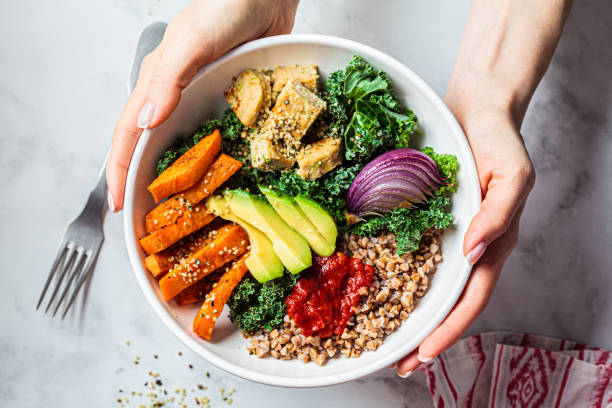Nutritionists warn again and again about the risks of a vegan diet – especially during pregnancy. Praxisvita shows what those affected should pay attention to.
If pregnant women want to continue to eat vegan, they should get very detailed information so that the child does not suffer permanent damage such as growth disorders. However, it is only from the fourth month of pregnancy that it becomes important how the woman eats because up to that point the growth of the fetus is still so low that the recommended diet does not differ from a diet with animal products. From then on, the need for certain nutrients such as proteins, folic acid, essential fatty acids, and vitamins A, B6, B12, and the minerals iron, zinc, and iodine increases.
How much does the protein requirement increase in pregnant women?
The protein requirement increases by about 20 percent from the fourth month of pregnancy and corresponds to about 60 grams of protein per day. With a vegan diet, this requirement can be met primarily with whole grain products, legumes, and nuts.
Why folic acid is so important during pregnancy
Folic acid is particularly important in a vegan diet during pregnancy, as it is essential for cell formation and cell division and influences the growth of the placenta and fetus. A lack of this in the first few weeks of pregnancy can lead to serious damage to the nervous system of the fetus. During pregnancy, the amount of folic acid should be increased from the normal 300 micrograms to 550 micrograms. The best way for a pregnant woman to absorb folate is through green vegetables or whole grain products.
(Chickpeas 333 micrograms per 100g, arugula 150 micrograms per 100g, oatmeal 87 micrograms per 100g)
What to replace essential fatty acids with?
Since fatty acids are important for the development of the brain and eyes of the fetus and they are only found in fish in a normal diet, vegans should make sure that they replace them with vegetable oils such as flaxseed oil.
How does the pregnant woman absorb enough vitamins?
Vitamin A: Pregnant women can get their vitamin A needs from green, yellow, and orange vegetables such as spinach, peppers, or carrots, which contain beta-carotene, which is then converted to vitamin A in the body. However, an excessive intake of vitamin A can harm the child and lead to growth disorders, skin changes, liver, and eye damage.
Vitamin B6: Due to the increased protein requirement, the need for vitamin B6 also increases during pregnancy. Thus, 1.9 milligrams instead of 1.2 milligrams of vitamin B6 should be absorbed, which corresponds to about 200 grams of oatmeal or 250 grams of whole-grain rice. Other products such as bananas, nuts, and legumes also contain vitamin B6.
Vitamin B12: The lack of vitamin B12 in a vegan diet during pregnancy can increase the risk that the child will suffer from a congenital heart defect and a neural tube defect. Thus, pregnant women should increase the amount of vitamin B12 from 3.0 to 3.5 micrograms. Vegans can absorb this with fortified foods such as cereals and plant-based drinks, but also with vitamin B12 toothpaste.
Women need these minerals during pregnancy
Iron: In pregnant women, the required iron intake doubles and thus increases to 30 milligrams daily. Women who live vegan are best able to meet this need with legumes or whole grain products and foods containing vitamin C, such as orange juice. Because if there is a lack of iron, the risk of premature birth or miscarriage increases and it can lead to the maldevelopment of the child.
Zinc: During pregnancy, the zinc requirement increases from 7 to 10 milligrams and can be covered with whole grain products and legumes as well as nuts and oilseeds. Zinc deficiency can be noticeable in a vegan diet through visual disturbances, immune deficiency, or loss of appetite.
Iodine: The daily amount of iodine should be increased from 200 to 230 milligrams in pregnant women. Women on a vegan diet do this best with an iodized table or sea salt, seaweed, or dietary supplements that contain plenty of iodine.
With the right diet, a vegan pregnancy is possible
With the exact intake of certain nutrients, a woman can also live vegan during pregnancy and give birth to a healthy child. However, she should be well informed beforehand and have her nutrient supply checked regularly by an expert.



